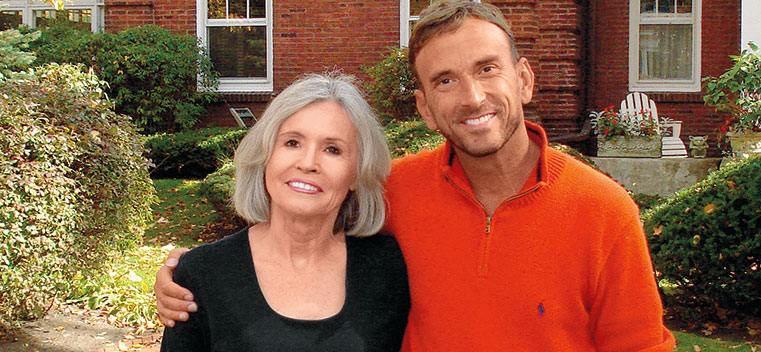
Helping Students in Need
To make a gift in support of the Margo Brown Northwestern Student Emergency Fund, visit wewill.northwestern.edu or call 847-467-5426.
Tell us what you think. E-mail comments or questions to the editors at letters@northwestern.edu.
Ever wonder about those strange designations we use throughout Northwestern to identify alumni of the various schools of the University? See the complete list.
Find Us on Social Media
Alumnus honors mentor by creating fund for students in crisis.
Greg Crouch remembers crying with joy when he was admitted to Northwestern.
He also remembers crying in despair during spring quarter of his freshman year, afraid he’d have to drop out because he didn’t have enough money for basic expenses.
Today, Crouch ’85 is striving to ensure that no other Northwestern student ever faces the same predicament. Earlier this year he created a fund that will provide low-income students with emergency financial assistance. Support from this fund will help cover the unpredictable costs of attending college, such as buying unanticipated textbooks, replacing a worn-out winter coat or booking a flight home to visit an ill family member.
Crouch dedicated the fund to the woman who enabled him to stay at Northwestern: Margo Clark Brown ’59, ’80 MA/MS, the University’s former assistant dean of students and assistant to the vice president for student affairs.
“Without Margo, I would have had to leave Northwestern,” Crouch says. “It breaks my heart just to think about it, because it does happen to some kids.”
Crouch, who grew up outside Pittsburgh, first met with Brown at a professor’s recommendation. He broke down in her office as he explained his situation.
“His family had no money,” recalls Brown, who retired from the University in 2001. “He was just so stressed. He had a work-study job, but there are only so many hours you can work outside the classroom before you fall behind.”
Brown secured funds that allowed Crouch to remain at Northwestern, and she served as his mentor as he worked toward his journalism degree.
She helped Crouch get a job writing articles for University publications. That gave him a portfolio of published writing samples he later used when applying for jobs. She also recommended Crouch for a position as a community assistant in a University residence hall.
Just before he graduated, Crouch told Brown he needed to talk to her about another serious issue. They walked to a lakefront bench, where Crouch told Brown he was gay. She was the first person he told about his sexual orientation.
“Margo took my hand and said, ‘There is nothing wrong in loving another person,’ ” Crouch says, his voice shaking. “She said I had nothing to be ashamed of.”
After graduation Crouch started a job at Money magazine in New York, marking the beginning of a nearly 30-year career in journalism. He later wrote for the Los Angeles Times, freelanced from Europe for the New York Times and National Public Radio, and spent 16 years reporting and editing in Germany, the Netherlands and Belgium for RTL, Europe’s largest commercial television network.
Crouch then taught journalism at two Dutch universities until 2012, when he joined First Pacific Advisors, a Los Angeles–based investment firm, as a vice president responsible for investigative research.
Crouch and Brown kept in touch, but Brown says she was overwhelmed when Crouch told her he was establishing the Margo Brown Student Emergency Fund.
“I’m just extremely honored,” she says. “I feel it’s a symbol of gratitude for all of us who work with students. If you make a difference for one student your whole life, that’s a great contribution.”
Enrolling more low-income students is a priority for the University, which means the Brown Fund will be a key resource for students facing financial difficulties, says Patricia Telles-Irvin, vice president for student affairs.
“People assume that our students come to the University with the resources to get their degrees and move on, but the reality is they’re also facing life issues,” Telles-Irvin says. “This fund gives students a bridge so they can continue their academic progress.”
After he graduated, Crouch paid back the money Brown had secured for him. Students who receive money through the new fund will also be expected — but not required — to pay back their assistance.
Crouch says the fund’s success depends on donations from other alumni. He views it as a tribute to Brown and others who are dedicated to helping students in crisis.
“Margo really, really cared,” he says. “I wouldn’t have accomplished what I have without her.”



 Facebook
Facebook Twitter
Twitter Email
Email


